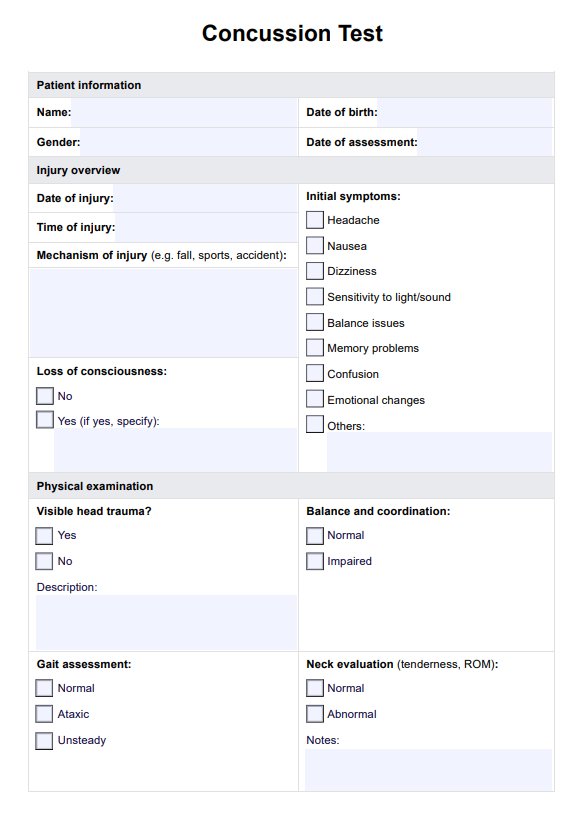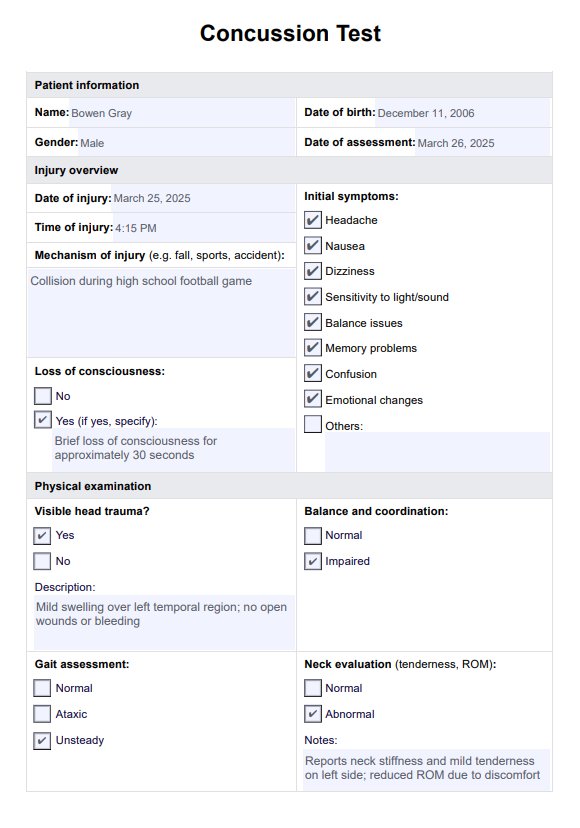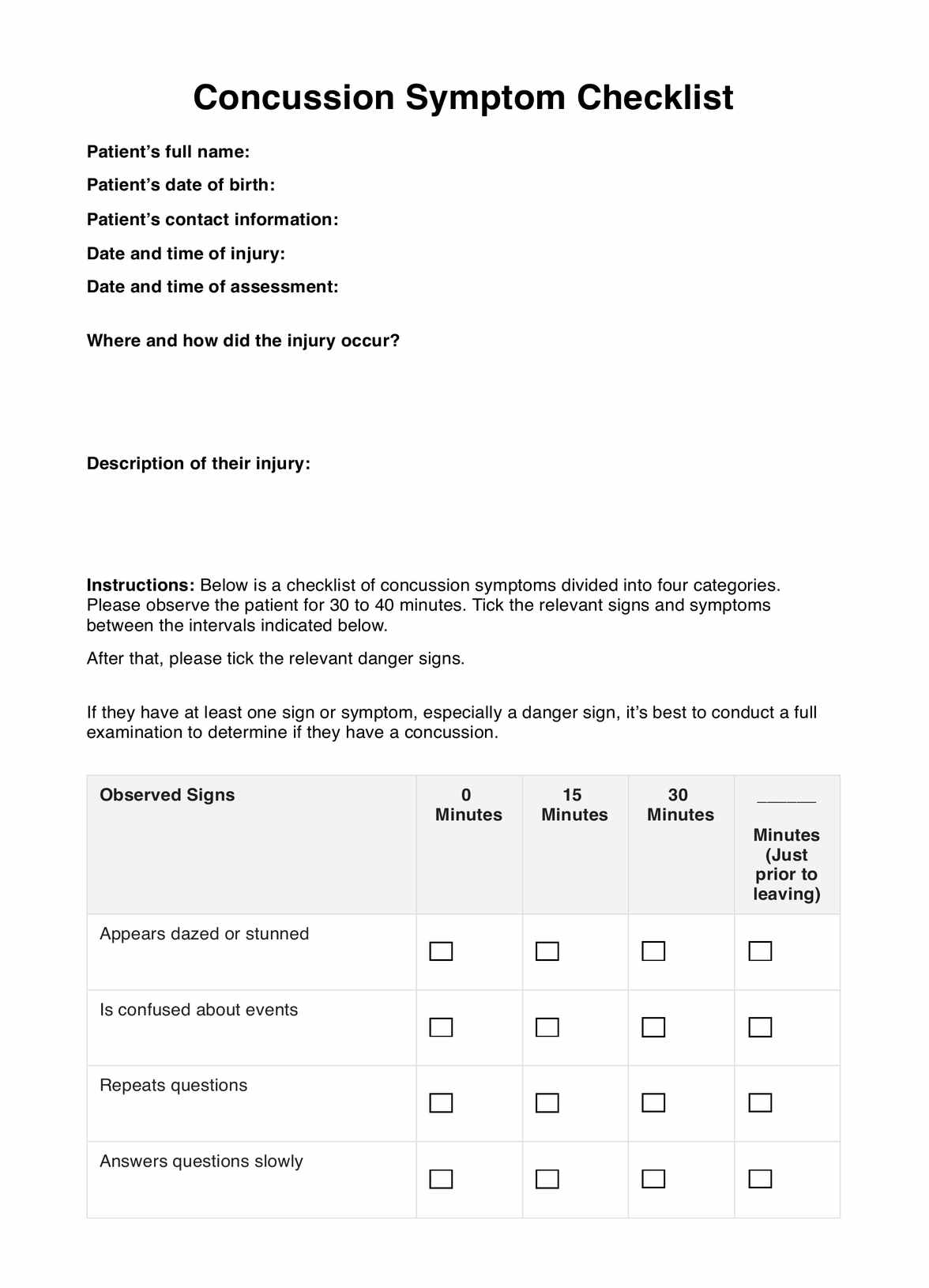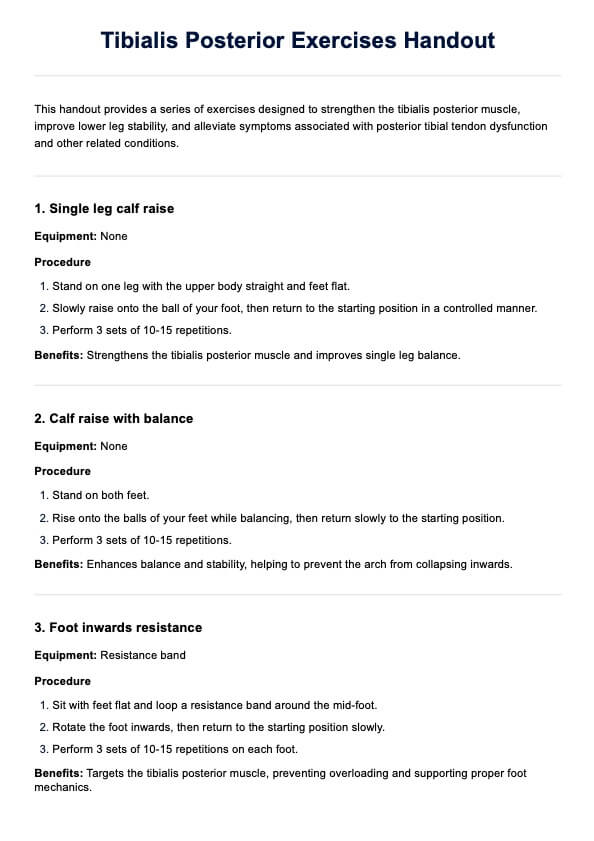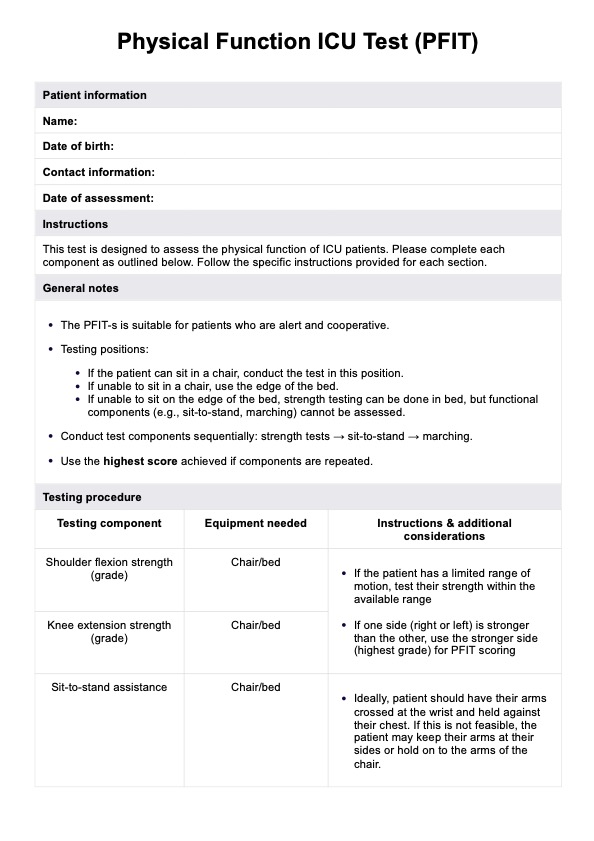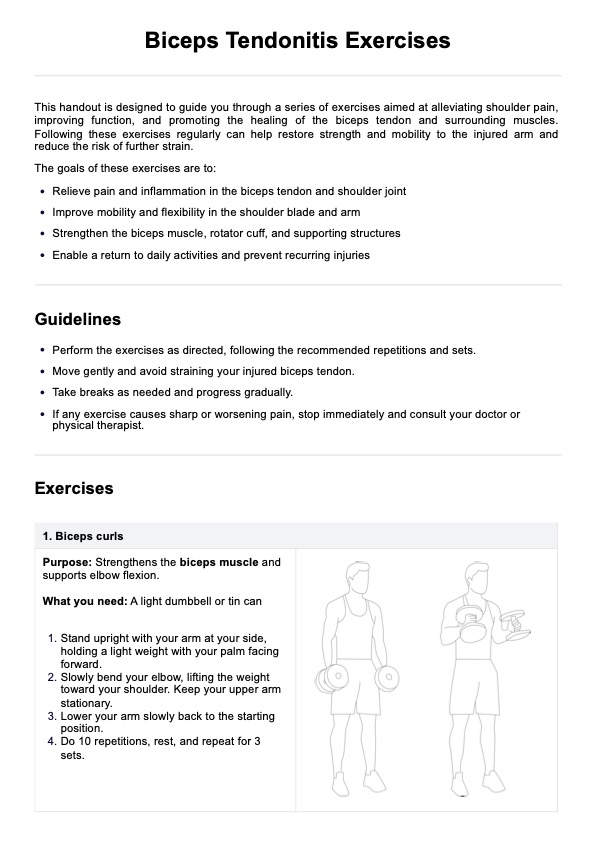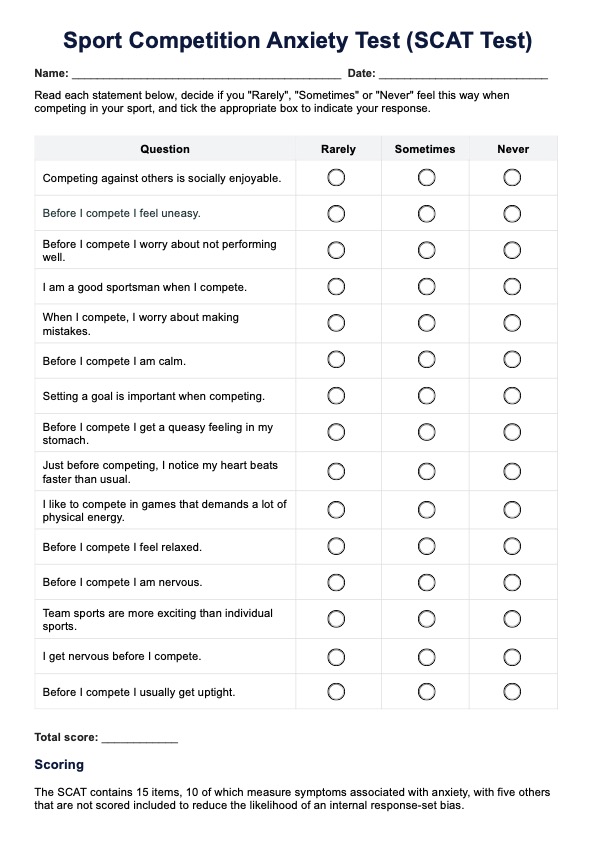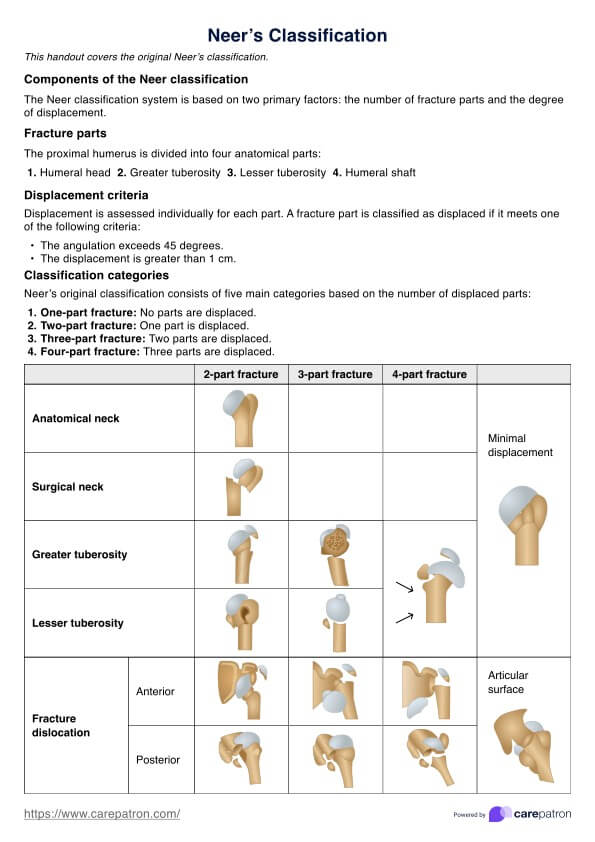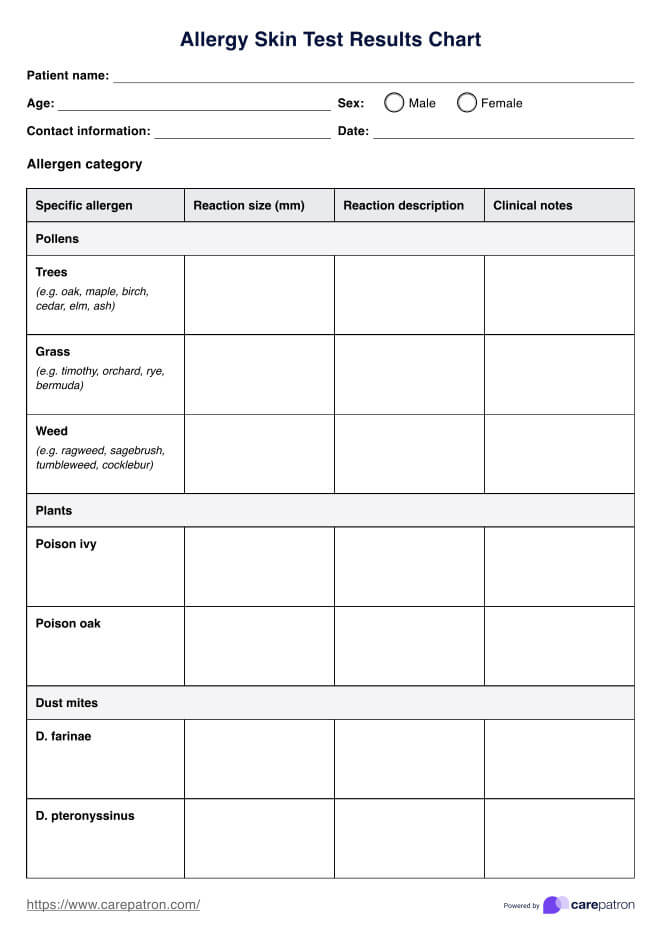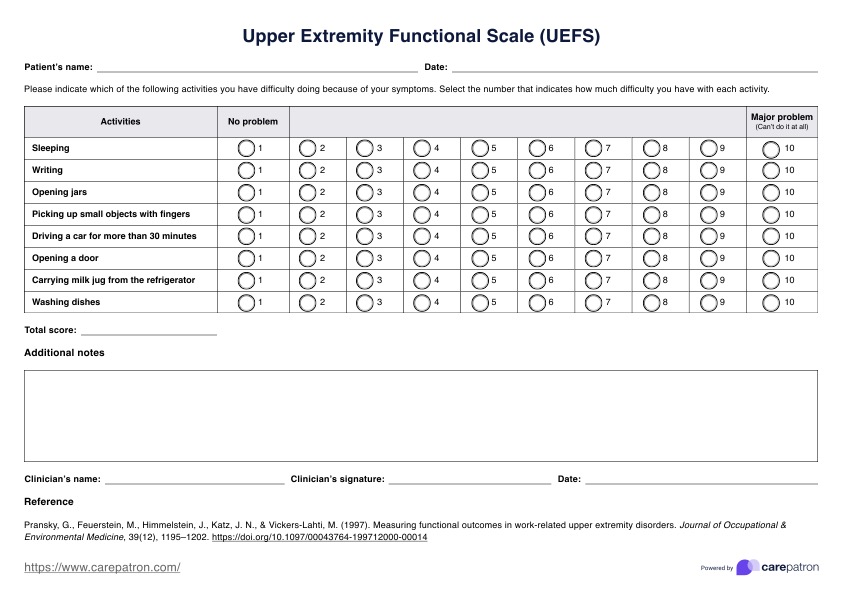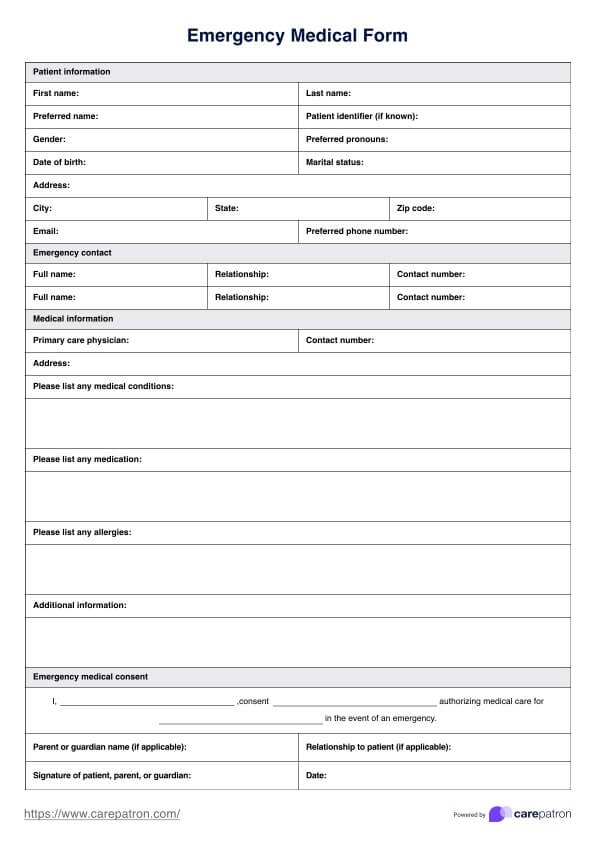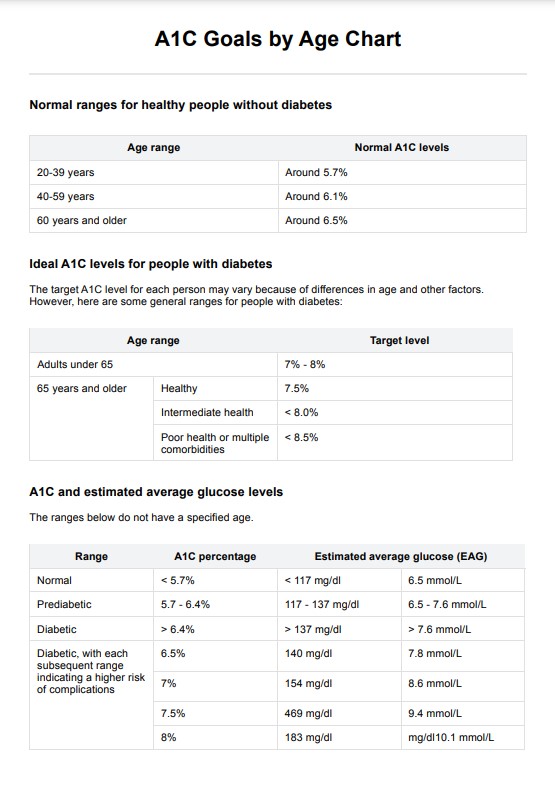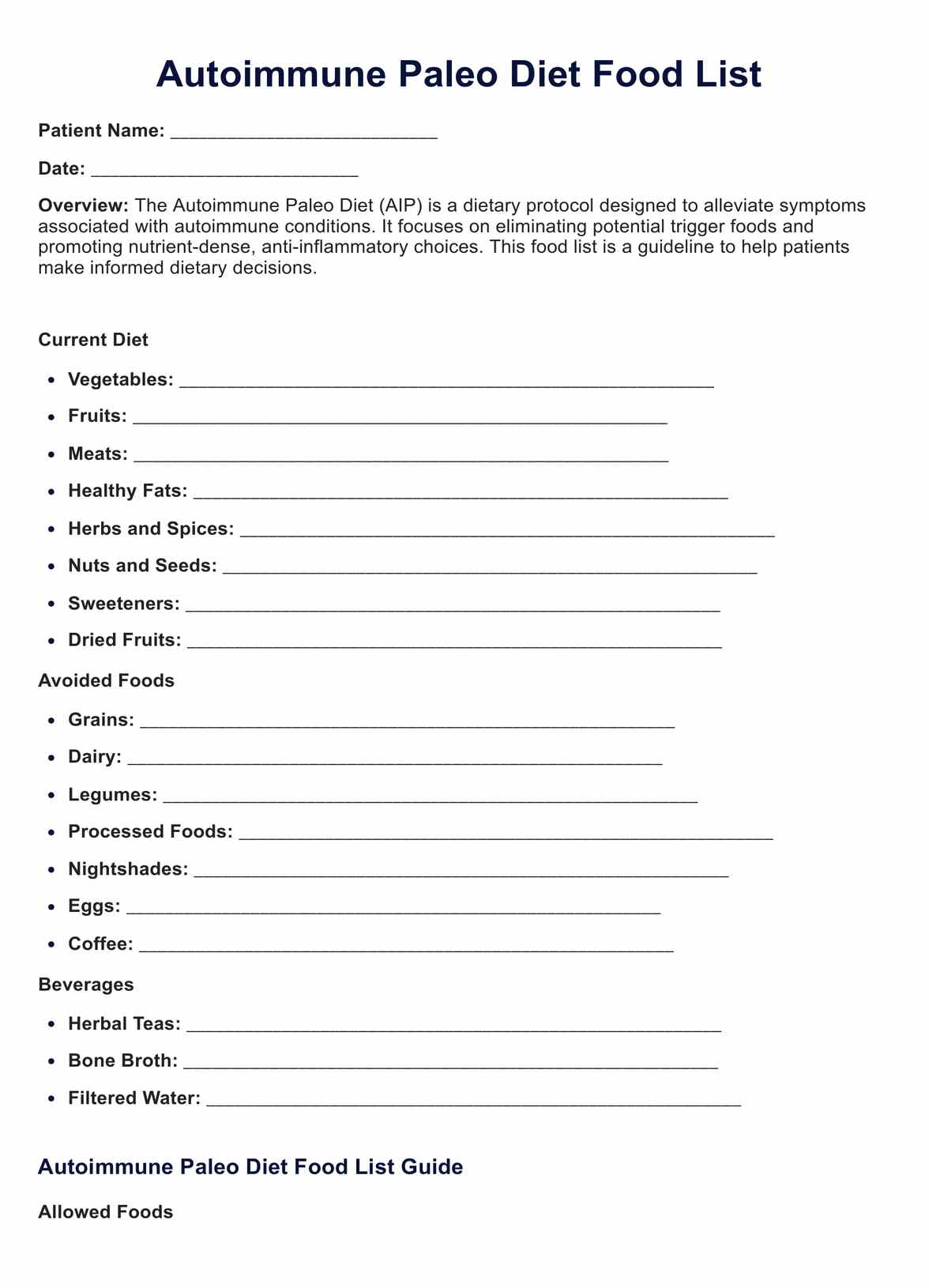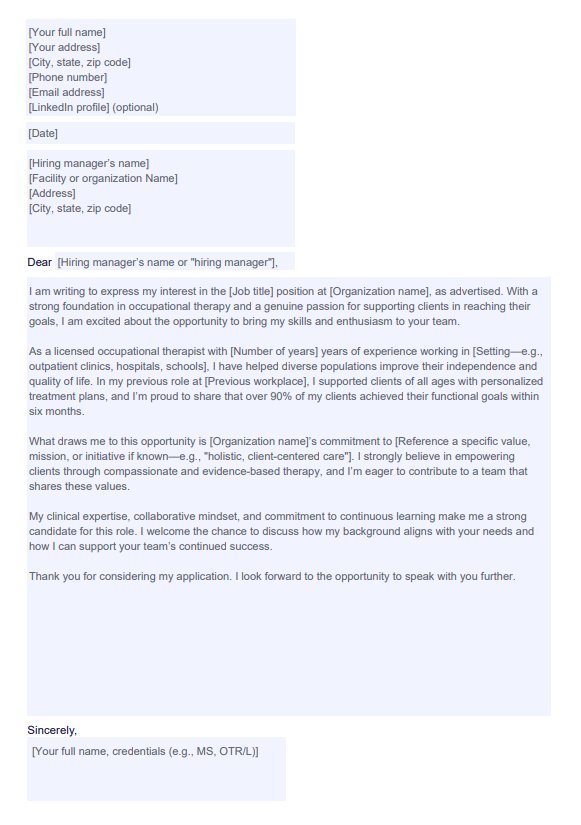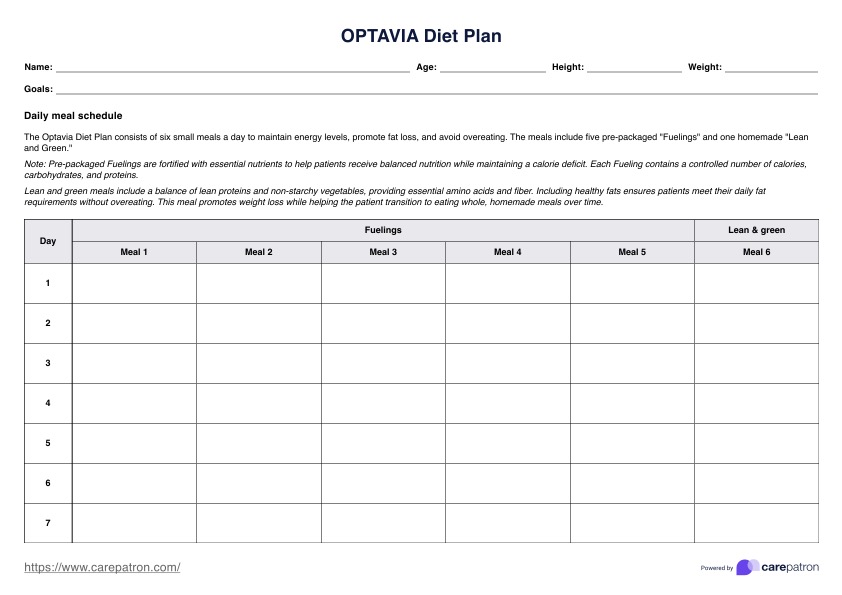Concussion Test
Download Carepatron's free Concussion Test PDF for effective clinical assessment and evaluate patient's head injury severity.


What is a concussion?
A concussion is a type of traumatic brain injury that occurs when a blow, jolt, or impact to the head—or a sudden force to the body—causes the brain to rapidly shift within the skull (Centers for Disease Control and Prevention, 2024). This movement can disrupt normal brain functions, leading to structural and chemical changes that result in a wide range of physical, cognitive, and emotional symptoms.
Clinically referred to as a mild traumatic brain injury (National Institute of Neurological Disorders and Stroke, 2024), a concussion still requires careful monitoring, as it can sometimes escalate into a more serious brain injury if not properly managed. Early concussion assessment, supported by baseline testing, can be instrumental in preventing complications, especially in individuals at higher risk, such as athletes or those with previous head injuries.
Causes
Concussions can result from a wide array of incidents, most commonly falls, sports injuries, motor vehicle accidents, or physical abuse (Ferry & DeCastro, 2023). In sports medicine, concussions are a frequent concern during contact sports, particularly during a sports season.
Additionally, head trauma from being struck by an object or experiencing whiplash from sudden acceleration or deceleration can also trigger a concussion (Agarwal et. al., 2024). While most cases are considered a mild concussion, repeated concussions or impacts can lead to a more serious injury or long-term neurological disorders.
Symptoms
Concussion symptoms can vary significantly depending on the individual and severity of the injury. Common symptoms include headache, dizziness, nausea, sensitivity to light and sound, confusion, and fatigue (NHS, 2023). Some patients may experience temporary loss of consciousness, ringing in the ears, or vision disturbances.
Behavioral changes such as irritability, emotional instability, or sleep disturbances are also frequently reported (Howlett et. al., 2021). In more severe cases, repeated vomiting, seizures, or prolonged confusion may indicate a medical emergency. Symptoms may appear immediately following the head injury or be delayed by hours or even days. A thorough physical exam, coupled with cognitive testing and neurological evaluation, is essential for accurate diagnosis.
Clinicians should remain vigilant for signs of a more serious brain injury, especially in patients involved in clinical trials or those with pre-existing neurological disorders.
Treatment
The cornerstone of concussion treatment is rest, specifically mental rest and physical rest, to allow the brain to heal (The Children's Hospital of Philadelphia, 2014). Patients should refrain from strenuous activities and mental activities like screen time or work that demands high concentration. Symptom management may include acetaminophen for headaches and anti-nausea medications for gastrointestinal discomfort (University of Michigan Health, 2017).
Importantly, alcohol and sedatives should be avoided. A gradual return to activity should be guided by a health care professional, especially in athletes or high-risk individuals. If concussion symptoms persist beyond the expected recovery window, referral to a specialist for further evaluation and other brain functions testing may be warranted.
Concussion Test Template
Concussion Test Example
What is a Concussion Test?
A Concussion Test is a structured clinical assessment used to evaluate brain function following a head injury, particularly to diagnose and determine the severity of a concussion (Graham et. al., 2014). It helps healthcare providers assess symptoms, monitor recovery, and decide when the brain has fully recovered. The test typically involves a physical exam, cognitive assessments, neurological evaluations, and in some cases, imaging tests such as a CT scan (computerized tomography) to rule out more severe injuries.
Concussion tests are critical in the emergency department, schools, and sports medicine settings, especially for student athletes and children. The goal is to guide medical care, ensure symptoms improve, and help patients return to activity safely.
How does our Concussion Test template work
The Concussion Test template by Carepatron streamlines how healthcare professionals evaluate, document, and monitor patients with suspected concussions. Follow these steps to get started:
Step 1: Access the test template
Click the “Use template” button to open the Concussion Test directly in the Carepatron app. This takes you straight into the platform—no additional navigation required. From there, you can begin inputting patient details and preparing for your assessment in a streamlined, user-friendly clinical workspace.
Step 2: Use the template in patient assessment
During intake or consultation, use the template to record patient demographics, injury history, and reported symptoms. The structured format supports accurate documentation, consistency across assessments, and ensures nothing critical is overlooked in the initial patient evaluation process.
Step 3: Conduct test
Perform the Concussion Test, including physical, cognitive, and neurological examinations. The template provides embedded sections for standardized tools like SAC, SCAT5, and BESS, allowing you to evaluate coordination, balance, reflexes, memory, and more—all while keeping clinical data centralized and organized.
Step 4: Gather and interpret findings
Input and review assessment results directly within the template. Evaluate whether symptoms, reflexes, or cognitive responses indicate a mild concussion or point to a more severe condition requiring further investigation. The template’s format enables quick analysis for confident clinical decision-making.
Step 5: Discuss findings with patient
Use the recorded results to guide a focused, informed discussion with the patient or caregiver. Clarify your clinical impressions, explain symptom patterns, and walk through what the data suggests—especially if further testing, rest, or monitoring is needed to support recovery.
Step 6: Provide patient support and next steps
Based on your interpretation, use the template to document your recovery plan—whether that involves mental rest, gradual return-to-activity, or referral to a specialist. This ensures continuity of care, provides clear documentation, and empowers patients through structured support and communication.
Benefits of using this test template
The Concussion Test template offers medical professionals a structured and efficient way to assess and manage patients with head trauma. It ensures that key clinical indicators are evaluated consistently, helping to treat and monitor concussion symptoms accurately across various cases.
By using this template, healthcare providers can quickly document injury details, perform standardized assessments, and determine the next steps—all within a single workflow. This reduces the risk of missing critical signs, especially when concussions happen in high-pressure environments like sports sidelines or emergency settings. It also supports clear communication between practitioners, whether in primary care, neurology, or sports medicine.
For children, who may present with less obvious symptoms, the structured format helps the doctor identify subtle impairments early and provide targeted care. Overall, this template improves documentation accuracy, supports continuity of care, and aids clinical decisions that help the brain heal effectively over time.
References
Agarwal, N., Thakkar, R., & Than, K. (2024, April 29). Concussion. American Association of Neurological Surgeons (AANS). https://www.aans.org/patients/conditions-treatments/concussion/
Centers for Disease Control and Prevention. (2024, May 16). Concussion basics. HEADS UP. https://www.cdc.gov/heads-up/about/index.html
Ferry, B., & DeCastro, A. (2023, January 9). Concussion. In StatPearls. StatPearls Publishing. https://www.ncbi.nlm.nih.gov/books/NBK537017/
Graham, R., Rivara, F. P., Ford, M. A., & Spicer, C. M. (Eds.). (2014, February 4). Concussion recognition, diagnosis, and acute management. In Sports-related concussions in youth: Improving the science, changing the culture (pp. 81–108). National Academies Press. https://www.ncbi.nlm.nih.gov/books/NBK185340/
Howlett, J. R., Nelson, L. D., & Stein, M. B. (2021). Mental health consequences of traumatic brain injury. Biological Psychiatry, 91(5), 413–420. https://doi.org/10.1016/j.biopsych.2021.09.024
National Institute of Neurological Disorders and Stroke. (2024, October 15). Traumatic brain injury (TBI). . https://www.ninds.nih.gov/health-information/disorders/traumatic-brain-injury-tbi
NHS Inform. (2023). Concussion symptoms and treatment. https://www.nhsinform.scot/illnesses-and-conditions/injuries/head-and-neck-injuries/concussion/
The Children's Hospital of Philadelphia. (2014, March 30). Supporting an athlete’s recovery from concussion. Children's Hospital of Philadelphia. https://www.chop.edu/centers-programs/concussion-program/supporting-athletes-recovery-concussion
University of Michigan Health. (2017). Concussion treatment and recovery. Michigan Medicine. https://www.uofmhealth.org/conditions-treatments/brain-neurological-conditions/concussion-treatment-and-recovery
Commonly asked questions
The 2-minute concussion test is a brief screening tool designed to quickly assess key neurological and cognitive functions following a head injury. It typically evaluates balance, orientation, memory, and coordination to help determine if further testing is needed.
The finger test for concussion assesses a patient’s ability to visually track a moving object, often a doctor’s finger, without jerking or abnormal eye movement. It helps detect issues with visual tracking, coordination, or brain function following head trauma.
The 3 R’s in concussion management stand for Recognize, Report, and Rest. They emphasize early identification of symptoms, prompt communication with medical personnel, and adequate recovery time to allow the brain to heal.
In the emergency department, clinicians will perform a physical and neurological exam to assess cognitive function, balance, and signs of serious injury. If needed, they may order a CT scan to rule out bleeding, swelling, or skull fractures.


